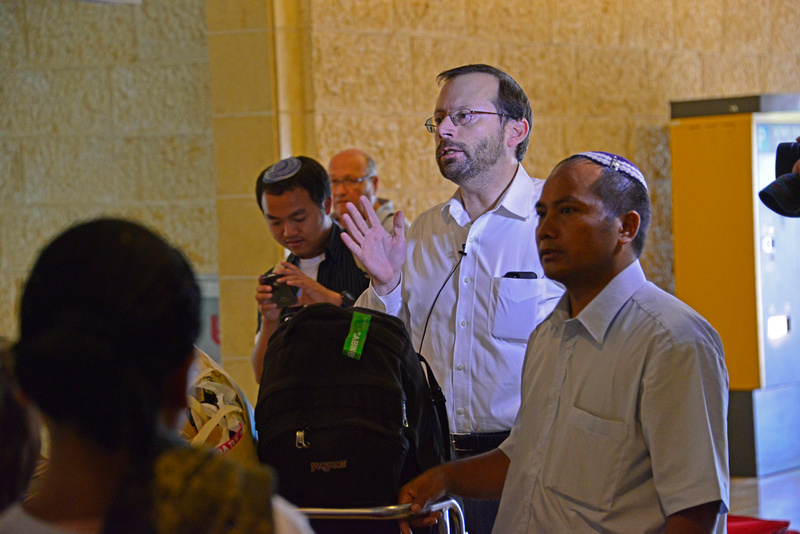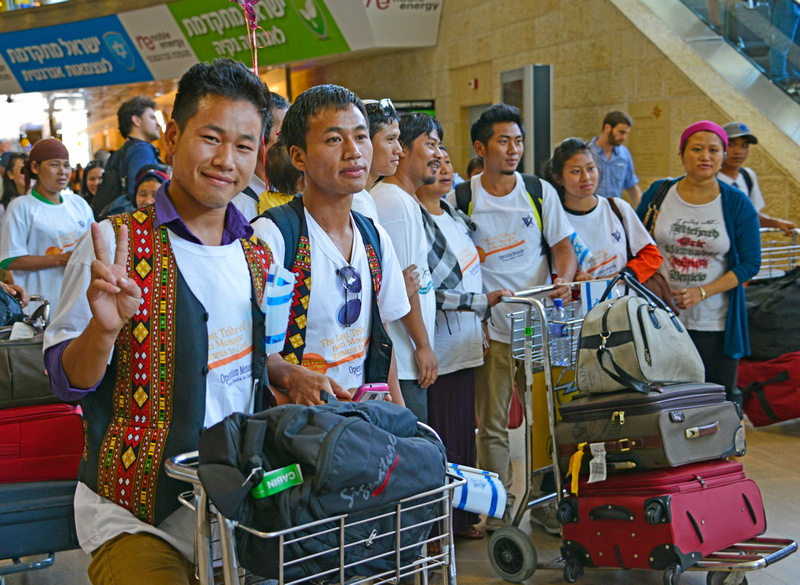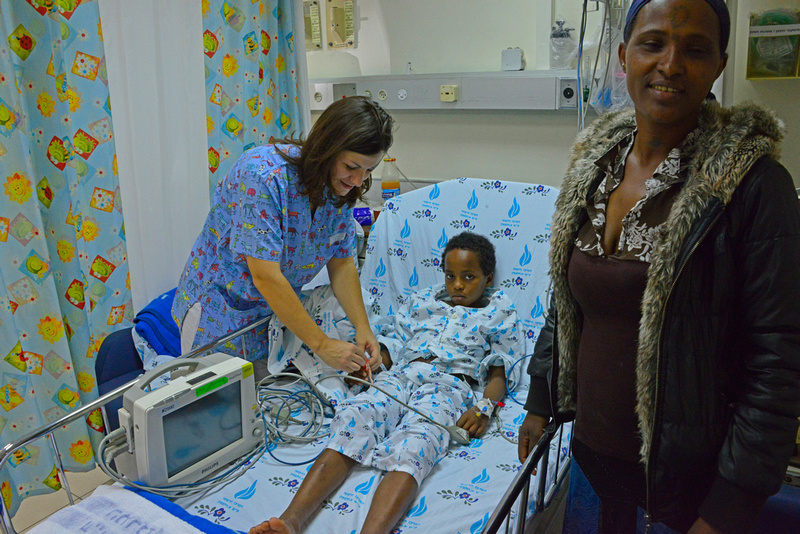2,000 YEARS AGO, YESHUA FOLLOWERS CALLED THEMSELVES "PEOPLE OF THE WAY"
2,000 YEARS AGO, YESHUA FOLLOWERS CALLED THEMSELVES "PEOPLE OF THE WAY"
2,000 years ago, the followers that Yeshua called together had been prepared to meet him by John the Baptizer. John called the nation to Repentance and a return to Holiness, a return to be a nation set apart from other nations to radiate the Presence of the Sovereign LORD who called them to be Holy. In the context of the Leviticus 20:26 instructions to be a people separated for the LORD, the LORD says, "'Thus you are to be holy to Me, for I the LORD am holy; and I have set you apart from the peoples to be Mine."
This is John the Baptizer's message to Israel.
Yeshua, to whom John directs his disciples, teaches them, in response to a question from a teacher of the Torah, to:
"'Love the Lord your God with all your heart and with all your soul and with all your mind and with all your strength'. The second is this: ‘Love your neighbor as yourself.’ There is no commandment greater than these.” (Mark 12:30-31).
Yeshua, of course, is quoting Torah for the teacher of Torah; in Deuteronomy 6:5, the Shema, the LORD's instruction is exactly what Yeshua quotes, "You shall love the LORD your God with all your heart and with all your soul and with all your might."
To this Deuteronomy passage, Yeshua adds another quotation from Leviticus 19: 18, "You shall not take vengeance or bear a grudge against the sons of your own people, but you shall love your neighbor as yourself: I am the Lord."
Yeshua, unquestionably a Torah observant Jew, and steeped in Torah and the Torah WAY, teaches his disciples to walk in this WAY. ("Unquestioned", except perhaps by Naim Ateek an Anglican priest who founded Sabeel, (ironically, in Arabic, "the way"), in an attempt to create a new narrative that marginalizes the Jews, and teaches that Jesus was actually not a Jew at all, but a poor Palestinian boy, already oppressed, although by the Romans, not the Jews).
Like Yeshua himself, all the Apostles he chose were Torah observant Jews; and the early church that gathered around the Apostles after Peter's sermon at the feast of Pentecost, in Hebrew the feast of Shavuot, were all Jews.
Recently, when I heard the phrase "the people of the way" as the name selected by the very early church, long before the time of the "church fathers", a new thought, new for me, that is, struck me; and I want to explore that thought here.
Why did these people refer to themselves as "the people of the Way"? Perhaps the most popular thoughts on the foundation for this phrase involve the comments Yeshua makes about the two "ways", the straight and narrow, and the broad; or the reference to himself as "the way, the truth and the life".
However, in the Scriptures out of which Yeshua taught, the phrase "prepare the way of the LORD" used in Isaiah 40 to 41, and Malachi 3 and 4, should certainly be considered as a possible foundation for this designation. In Malachi, the preparation is linked to this promise: "I will send you the prophet Elijah before that great and dreadful day of the LORD comes". As Yeshua points out in Matthew 11, there may be multiple layers of meaning in prophetic words, so John the Baptizer could be considered an Elijah, without negating the prophecy that Elijah's coming will precede the coming of Messiah.
In both Isaiah and Malachi, the phrase is used in connection with the arrival of a "messenger" who will prepare the way for a special coming of "our God". Isaiah: "In the desert prepare the way for the LORD; make straight in the wilderness a highway for our God". Malachi: "'See, I will send my messenger, who will prepare the way before me. Then suddenly the Lord you are seeking will come to his temple; the messenger of the covenant, whom you desire, will come,' says the LORD Almighty."
The context of this passage is a call to prepare for the coming of the LORD, the very call sounded by John the Baptizer, and expressed by Isaiah as a "comfort" to God's people. The passage begins a multi-chapter prophetic poem, beginning in 40 and unfolding through the remainder of the book to chapter 66, that speaks of many aspects of the redemption of Israel including the regathering of the people from all corners of the earth, the rebuilding of the towns and the land and the final Redemption in which "the LORD rises upon you and his glory appears over you" and "Nations will come to your light, and kings to the brightness of your dawn"; a Redemption in which "he establishes Jerusalem and makes her the praise of the earth" and her people "will be called priests of the LORD" and "named ministers of our God", and "All who see them will acknowledge that they are a people the LORD has blessed".
So, perhaps the early church saw themselves as part of the process Isaiah speaks of in chapter 40: "A voice of one calling: 'In the desert prepare the way for the LORD; make straight in the wilderness a highway for our God. Every valley shall be raised up, every mountain and hill made low; the rough ground shall become level, the rugged places a plain. And the glory of the LORD will be revealed, and all mankind together will see it. For the mouth of the LORD has spoken.'"
Malachi 3 and 4, where he uses the similar phrase, "prepare the way before me", is likewise a prophecy about a time when, speaking of the Jews in their land, "all the nations will call you blessed, for yours will be a delightful land".
Since these descriptions clearly indicate that, however Yeshua is to be considered the Messiah, the conditions described are not yet in place; and since the Scriptures say so, Messiah is still to arrive. In this interval, are we called to be part of preparing the Way for the LORD? Is this calling similar to the Hebrew understanding of "Tikkun Olam", a responsibility to "repair the world"? If there is a connection, should we as the Church see ourselves as partners with the Jews who have made Aliyah and see their presence in the land as part of the prophesied restoration from the four corners of the world; a restoration linked to the Redemption and coming of Messiah? Is this a partnership that involves working together in Israel to settle new immigrants and feed the poor? Are we called to be "our Jewish brother's keeper"? Are we called to explore the WORD together to facilitate our understanding of each other?
When the early church was being called "the Way", as we see repeatedly in the book of Acts, the Jewish people were living in the land; under Roman domination to be sure, but still in the land and anticipating the establishment of King David's throne.
To me this was a new understanding of "the Way" as a designation for the Church; but given what we are being drawn into, I like it!
We can help Michael Freund bring the Bnei Menashe from India to their new home in Israel.




We can help save an Ethiopian child's life, through Save a Child's Heart foundation, operating in the Wolfson Hospital in Holon.


The opportunities are endless!